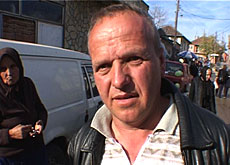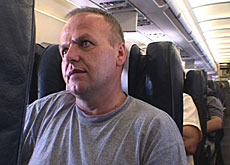Life in Kosovo

As the Swiss vote on whether to tighten the country's asylum laws, swissinfo followed a Serbian Kosovar on his journey home.
In the last of a three-part series, Julie Hunt finds out how refugee Zoran Stojanovic is coping with life in his village in Kosovo.
In the peaceful village of Pones in Kosovo, life appears to continue as it has for centuries.
Zoran Stojanovic, an ethnic Serb, chops wood and stocks the larder in preparation for winter, while his wife Jasmine bakes bread.
The idyllic scene belies the fact that they feel like prisoners in their own village, afraid of venturing far for fear of revenge attacks by Albanians who were victims of Serb ethnic cleansing.
The children have a school picnic today. At one time, the class would have sought out the nearest beauty spot, but these days they keep within the school boundaries.
Safe passage
Jasmine will only visit the nearby town of Gnilane/Gjilan in a United Nations-escorted bus for Serbs. It takes them to the twice-weekly Serb market, where they feel safe buying their groceries.
Sacha Markovic from the Danish Refugee Council sits at the front of the vehicle as it does the rounds of Serb villages in the area.
“The situation now is much better than before,” he tells me. “But the people are not yet sure about walking around town and going shopping there. I’m not sure what is going to happen to us in the future.”
The Stojanovics’ scant resources are running low. Zoran received SFr2,000 ($1,380) when he abandoned his refugee claim in Switzerland and returned home in August under the Swiss government’s voluntary return scheme.
But most of that money is now spent, and he is desperate to find work.
Zoran has a degree in engineering and was a school director in his village before he fled to Switzerland.
But his hopes of winning back his directorship have been dashed, and applications for work at various lighting and heating factories in the Gnilane/Gjilan region have been come to nothing.
Economic desert
In a climate of high unemployment and economic crisis, it is particularly difficult for ethnic minorities to find work.
“Many people here have been looking for work for three years and some of them are maybe starting to get jobs now,” says Lorena Lando from the International Organization of Migration.
“But still the competition out there is really tough. So he shouldn’t give up hope, but definitely it’s a slow process.”
Lena advises Zoran to apply to the police force, where Serb officers are in short supply. He signs up but is told the next recruitment will not start until April 2003.
It seems to him that he has explored every possibility, and failed to find a way to feed his family.
End of the road
After much thought and long discussions with Jasmine, he decides to try to return to Switzerland on a visitor’s permit, and find work there – illegally if necessary.
He knows that he will be required to repay the SFr2,000 he received when he left, but he is undeterred by this.
Zoran’s decision is not simply financially driven; he sees no future for Serb minorities in the new Kosovo.
“Before I returned to Kosovo, I watched TV and read newspaper reports that gave me the impression that the situation was much improved and that I would be able to pick up where I left off,” he says.
“This just isn’t true. We are perhaps able to move around more freely, but for Serb people, the employment situation is disastrous.
“The Albanians just don’t want to work with us. The only way we can have a future here is if more Serbs return.”
Uncertain future
Visiting the province this week, UN Secretary-General Kofi Annan cautioned that much work remained to ensure its people lived together in peace.
“Though Kosovo has already covered a lot of ground, it is now that the really hard part begins – the part that is about building more than houses, roads, infrastructure and even new institutions,” he said.
“The part that is about overcoming the legacy of the past and building a society anchored firmly in the rule of law and democratic institutions, mutual respect and trust”.
This “building” work may simply take too long for people like Zoran Stojanovic, whose main concern is to provide an income and a future for his family – simple objectives that seem to him unobtainable for most ethnic Serbs in post-war Kosovo.
swissinfo, Julie Hunt
Kosovo was placed under UN-led administration in 1999 after three months of Nato bombing halted Serb repression of ethnic Albanians
Some 200,000 Serbs and other minorities fled Kosovo, fearing attacks in revenge for ethnic cleansing
The province remains legally part of Yugoslavia, but its Albanians, who make up 90 per cent of the population, are demanding independence
Zoran Stojanovic is an ethnic Serb who has abandoned his refugee claim in Switzerland to return to his native Kosovo.
The engineer is returning to a climate of fear, post-war economic stagnation and high unemployment, where ethnic Serbs claim they are at the bottom of the pecking order in the job stakes.
After three months of searching for work, he gives up.
He feels his best option is to try to get back into Switzerland – illegally if necessary.

In compliance with the JTI standards
More: SWI swissinfo.ch certified by the Journalism Trust Initiative




You can find an overview of ongoing debates with our journalists here. Please join us!
If you want to start a conversation about a topic raised in this article or want to report factual errors, email us at english@swissinfo.ch.